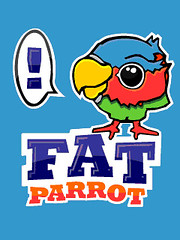On Fat Parrots, Disposable Games, and Selling Android Apps
(One in a line of blog posts that's sat in my TODO list for months)
I've written about gold cards before; they're our slightly less confident version of the fabled Google "20% time", and an opportunity for FPers to play, collaborate, learn, or scratch an itch. We try to push these days towards producing demonstrable (even if half-finished) products. At a bare minimum a gold card results in a short talk to the rest of the company on our planning days; most of them include demos.
This left us with a little pile of interesting bits and bobs: products in an indeterminate state, somewhere between "oooh it works" and "wow that's useful". Whilst we launched The Guardian Anywhere under the Future Platforms name, quite a few of these experiments are a little rougher... so we wanted to find a place where they could be released on an unsuspecting public without necessarily having the polish that we would prefer to be associated with our work.
 Enter Fat Parrot, stage left. So avant garde that it doesn't even have a web site, it's a brand where we can stick stuff. Things you wouldn't normally put online; things you couldn't normally put online; things you shouldn't normally put online. Right now that's:
Enter Fat Parrot, stage left. So avant garde that it doesn't even have a web site, it's a brand where we can stick stuff. Things you wouldn't normally put online; things you couldn't normally put online; things you shouldn't normally put online. Right now that's:
- Brain splatter, a shoot-yourself-in-the-head simulator;
- F1sh, a simple tile-matching game;
- Motion sensor, an Aliens-style, erm, motion sensor live wallpaper;
- Snappy Easter, a pleasantly blasphemous arcade game;
- Zombie vs Monkie, a dirt simple touch game;
- Poggle, an accelerometer-based puzzle game;
At the back of my mind when doing some of this stuff was the idea of topical games: that you might hear a news story in the morning, release a reskinned version of a game based on it within an hour or so, and have it available for a day or so. Deliberately disposable applications, designed to be "consumed like songs" as Mr Applesquid would put it. I think there's an interesting business to be done here, but unfortunately not in app stores that have week-long lead times for a launch...
Poggle had a fair bit more time put into it than the others - Tariq Tamuji, long time FP Guardian Of Quality, put it together and polished it over a period of a couple of months. We originally released it as a paid app (at a £0.99) price point, thinking that it might be an interesting commercial experiment; and I'm very glad we did this.
In the course of about a month, Poggle sold 5 copies, 3 of those were from us. This was absolutely shocking; I'd have expected it to have racked up a small percentage (maybe 1-5%) of the equivalent downloads we have from free products - so maybe a few tens, a hundred or so - and this was way worse than that... and means that we'll be very careful about recommending Android app sales as a route to revenue for our customers. I'm not claiming it's impossible to make money selling Android apps, or that no-one is doing it... just that it's tough. I'm glad we've learned this on our own time, and that the lesson wasn't one that a customer ended up paying for.
As an aside... I think it should be straightforward to model the size of the Android paid download opportunity by presuming that downloads follow a quite standard power law distribution and plotting individual apps along such a curve, to extrapolate figures. We know how many apps sell more than 250,000 units, how many sell 5-10,000 units, and so forth...